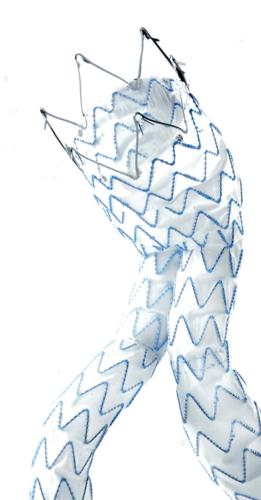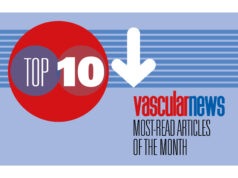
Medtronic has reported that its Endurant II abdominal aortic aneurysm (AAA) stent graft system continues to demonstrate long-term durability and consistent outcomes in a real-world setting. The five-year ENGAGE global registry data were presented for the first time at the 2017 CX Symposium in London, UK.
The ENGAGE registry evaluated more than 1,200 patients. The five-year data, which included imaging follow up from approximately 500 of these patients, showed a 97.8% freedom from aneurysm-related mortality (ARM) and a compelling 89.4% stable or decrease diameter AAA sac at five years. The data demonstrated an 84.3% freedom from secondary endovascular procedures.
“Out to five years, the ENGAGE data showed low ARM and secondary procedure rates. This further demonstrates both the benefit of the technique used with Endurant as well as the durability of the graft itself,” says ENGAGE investigator Philippe Cuypers, vascular surgeon, Catharina Hospital in Eindhoven, The Netherlands, who presented the data. “The clinical rigour and scope of the ENGAGE registry has made it a valuable data set that represents the types of challenging anatomies physicians encounter in daily clinical practice.”
ENGAGE represents the most robust post-market registry ever initiated in the study of endovascular aortic repair (EVAR) with 79 sites in 30 countries. The ENGAGE registry was initiated less than one year post-CE mark and has clinical follow up out to 10 years. The goal of ENGAGE remains to gather evidence in a real-world patient population, including patients with challenging anatomy who have historically been difficult to treat, and are associated with limited eligibility for endovascular repair and higher rates of secondary interventions. A rigorous monitoring protocol has resulted in a clinical follow-up compliance of more than 90% and imaging compliance of more than 75% at five years.
The Endurant stent graft system was also featured in an additional presentation. Peter Holt, senior lecturer and honorary consultant in vascular surgery at St George’s University of London, London,UK, presented the design of the LEAR analysis, which aims to reduce long-term aortic risk using a modified clinical surveillance program that more accurately portrays reintervention risk.













